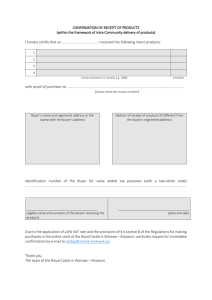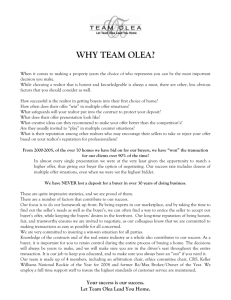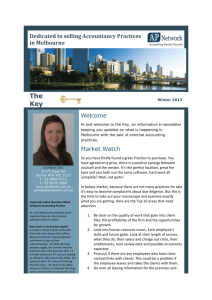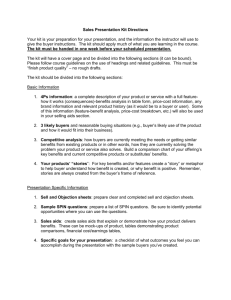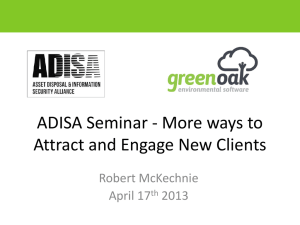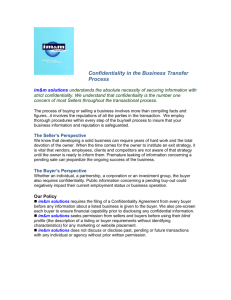Syllabus - La Salle University
advertisement
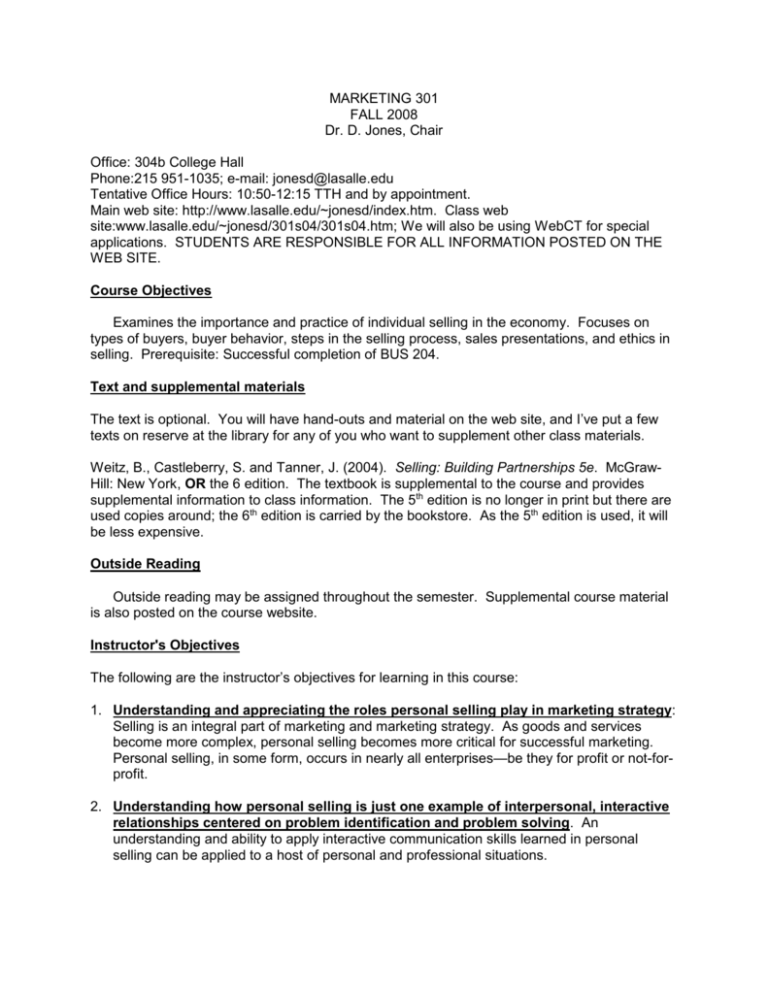
MARKETING 301 FALL 2008 Dr. D. Jones, Chair Office: 304b College Hall Phone:215 951-1035; e-mail: jonesd@lasalle.edu Tentative Office Hours: 10:50-12:15 TTH and by appointment. Main web site: http://www.lasalle.edu/~jonesd/index.htm. Class web site:www.lasalle.edu/~jonesd/301s04/301s04.htm; We will also be using WebCT for special applications. STUDENTS ARE RESPONSIBLE FOR ALL INFORMATION POSTED ON THE WEB SITE. Course Objectives Examines the importance and practice of individual selling in the economy. Focuses on types of buyers, buyer behavior, steps in the selling process, sales presentations, and ethics in selling. Prerequisite: Successful completion of BUS 204. Text and supplemental materials The text is optional. You will have hand-outs and material on the web site, and I’ve put a few texts on reserve at the library for any of you who want to supplement other class materials. Weitz, B., Castleberry, S. and Tanner, J. (2004). Selling: Building Partnerships 5e. McGrawHill: New York, OR the 6 edition. The textbook is supplemental to the course and provides supplemental information to class information. The 5th edition is no longer in print but there are used copies around; the 6th edition is carried by the bookstore. As the 5th edition is used, it will be less expensive. Outside Reading Outside reading may be assigned throughout the semester. Supplemental course material is also posted on the course website. Instructor's Objectives The following are the instructor’s objectives for learning in this course: 1. Understanding and appreciating the roles personal selling play in marketing strategy: Selling is an integral part of marketing and marketing strategy. As goods and services become more complex, personal selling becomes more critical for successful marketing. Personal selling, in some form, occurs in nearly all enterprises—be they for profit or not-forprofit. 2. Understanding how personal selling is just one example of interpersonal, interactive relationships centered on problem identification and problem solving. An understanding and ability to apply interactive communication skills learned in personal selling can be applied to a host of personal and professional situations. 3. Learning and applying basic selling interactive techniques. Selling involves helping identify buyer wants and needs, and helping the interaction move to making a sale when possible and appropriate. Selling skills are centered on listening and questioning skills, understanding how individuals are interacting during the interaction, and setting up goals and outcomes for subsequent interactions. 4. Understanding and appreciating how personal selling interacts with buyer behavior: Personal selling exists because buyers cannot solve all their problems independently and because of the social nature of shopping. Selling facilitates buyers’ attempts to solve problems and satisfy needs. A key aspect of selling is researching and understanding buyers’ needs and all the alternative ways those needs can be met. 5. Understanding and appreciating the interactive nature of selling and selling relationships: Selling is highly interactive, and often has a large amount of “give and take” between buyer and seller. Successful selling involves building relationships with buyers. 6. Understanding the basics of sales management: Sales has several management issues such as territory management, time management and performance evaluation. 7. Designing and delivering sales presentations. Sales presentations are planned and executed, with contingencies planned for different buyer responses. We will study a host of different interactive styles and techniques to build seller-buyer relationships. School of Business Learning Goals Opportunities in This Class Learning Goals Self Assessment and Development: Job-Related Skills Critical Thinking and Problem Solving Communication Skills Course Activities You will learn if personal selling interests you as a career starting point You will have the opportunity to learn interactive selling techniques and to critique your video recorded performance You will prepare a self assessment of strengths and shortcomings as they relate to prospective employers’ perceptions of your resume and credientials You will find and interview professional salespeople (networking and interviewing) You will prepare an updated resume utilizing personal selling techniques You will be able work up a product and a prospective buyer for a sales presentation You will learn and practice interpersonal, problem solving communication skills in selling roleplays Learning Goals (cont.) Using Data and Technology Core Business Knowledge Ethics, Social Responsibiity, and social forces Course Activities (cont.) You will learn basic financial analysis skills as they apply to products’ prices and costs You will learn how personal selling fits into the promotional part of the marketing mix, and how personal selling is crucial to accomplishing the organization’s goals You learn ethical and unethical selling techniques and related business practices Learning Outcomes Learning outcomes are skills that can be demonstrated and measured as a result of having taken the course. Because outcomes must be measured, they are usually behaviorally based. The following is a list of skills you should possess to some degree by the end of this course as evidenced by your role play performances. The following are examples of learning outcomes as they related to interpersonal selling interactions: To be able to explain a product or service from a consumer, benefit-based perspective. To ask open-ended questions to identify relevant information about buyer’s situation, possible problems, implications of problems and possible benefit-based solutions. To be able to identify buyer interpersonal social style and to adopt one’s relational and content communications to the buyer’s social style. To help role play partners identify potential solutions to business problems. To recognize objections in interactions, identify the basic elements of the objection and use appropriate interpersonal selling techniques to resolve the objection. To be able to create and use “selling metaphors” to explain key product or service features and benefits. To be able to identify and pursue buyer-seller interactions that lead to trying and adopting solutions to buyer problems (“closing”). To identify interpersonal interactions in terms of negative, zero and positive sum games, and to alter one’s interactive communications to maximize positive sum outcomes. Evaluation Traditionally Graded (Date) Exam #1 Exam #2 Individual Assignments Job Interview Sell and Objection Sheets Sales Person Interviews Final Roleplays Sales Role Play Presentation “Kit” Role Play Self Assessment (Due next class day after role play) Behaviorally Graded Buyer Role Play Seller Role Play Total Weight 20% 15% 10% 15% 15% 10% 5+% 10% 100% Exams Two exams will be given. Exams consist of written questions. You are strongly encouraged to use this to ensure you understand the text material. Projects You will complete two individual projects, which are customized to the individual student. For the first project you will locate a job, co-op or internship position in which you are interested and prepare your resume, feature-benefit sell sheets, and a potential objection or “shortcomings” sheet in anticipation of interviewing for this opportunity. For the second you will locate and interview two business-to-business professional sales people. Details are on the class Web site. You will participate in personal selling training role-plays and “working up” a product and potential buyers. In these interactions you will role play both buyers and sellers. These exercises are designed to help you learn how to design and deliver a sales presentation and for you to personally learn and use interpersonal influence strategies. Each student will choose a product to sell in a business-to-business situation and will prepare sales aids and a “Presentation Kit” which is a write-up of his/her product. The Kit is the complete preparation for the sales presentation and along with preparing for the presentation will be used to prepare the buyer. In the buyer role, each student will prepare a specific buying scenario based on the seller’s Kit, and will have to give at least two solid objections, type information, buying cues, closed ended question traps and other information (this will make more sense as the semester goes on). Finally, while it is not a formally graded exercise, two movies have themes that relate to much of what we go over in this course. The first is “GlennGary Glen Ross.” This is a remake of a Broadway play about the dark side of personal selling that has received considerable critical acclaim. However, students are cautioned that the movie contains raw language and adult scenes. The web site has basic questions to consider when watching the movie. The second movie is “Thank you for smoking.” While the content of the movie is more public relations than personal selling, much of the communication techniques used by the protagonist relate well to personal selling. Students are also cautioned this movie has adult themes and interactions. Policies Students are responsible for all information posted on the class Web site. Exams will be taken on assigned dates and written and group projects are due on the assigned dates at the beginning of class. Please note that assignments may be handed in any time up until the final due date. To receive credit, hard copies papers must be turned in on or before due dates; no papers are accepted for any reason after the final due date. The fole Make-up exams are given only with prior approval by the instructor for reasons such as athletic travel or job interviews. The class has no formal attendance policy because you are expected to attend class. A significant amount of course material is given in lecture notes, and understanding of personal selling is developed through class discussion and role plays. If you feel that you will be missing any classes, you should discuss this with me at the beginning of the course as missed classes significantly lower test grades, result in a “0” grade for in-class exercises and participation, as well as indicate a lack of interest in the class and the material. While it is unusual, because of the experiential nature of the course, the syllabus and course topics may be modified depending on the rate that the class progresses. The +/- grading option is used. An "A" in this course represents excellent effort, participation and quality work. Written work has specific formatting requirements that must be followed to receive credit: all assignments will be stapled, typed, with a cover page with the assignment, your name and the date. Papers are graded anonymously; please do not put your name on any of the other pages. Spelling, grammar and organization are a part of your grade. Papers that do not follow these guidelines cannot be accepted. Please follow the guidelines for homework posted on the website and those that are given with the assignment. All work submitted must be your own work. As I read all the papers and test answers, highly similar work is readily apparent. However, you are encouraged to seek help from the writing center as well as from your instructor.

